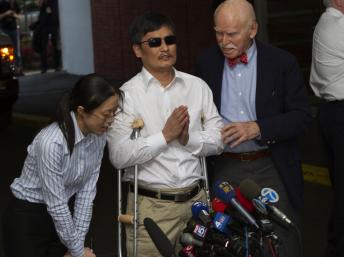
Luật sư Trần Quang Thành trả lời các nhà báo ngay khi tới phi trường Newark, New York ngày 19/05/2012. REUTERS/Keith Bedford
Nhà hoạt động nhân quyền, luật sư mù Trần Quang Thành sáng hôm qua đã được cùng với vợ và hai con lên máy bay ở Bắc Kinh và tối hôm qua, 19/05/2012, đã đáp xuống sân bay Newark, New York. Ngay khi đặt chân tới Hoa Kỳ, luật sư Trần Quang Thành đã bày tỏ lòng biết ơn chính phủ Mỹ và nhiều bạn bè đã giúp đỡ ông, đồng thời cũng tỏ ra hài lòng khi thấy chính phủ Trung Quốc đã xử lý vụ này một cách «chừng mực».
Luật sư Trần Quang Thành đã trốn khỏi nơi quản thúc tại gia vào ngày 22/4 trong một vụ đào thoát với nhiều tình tiết rất ly kỳ và sau đó chạy vào tỵ nạn trong đại sứ quán Mỹ, vài ngày trước khi Ngoại trưởng Hillary Clinton đến Trung Quốc để tham gia cuộc « đối thoại chiến lược và kinh tế » thường niên giữa Washington và Bắc Kinh.
Sáu ngày sau, ông Trần Quang Thành chấp nhận rời sứ quán Mỹ để được chữa trị trong bệnh viện, nhưng ngay sau đó ông đã tỏ ý muốn rời Trung Quốc vì không tin tưởng vào chính quyền Bắc Kinh. Đến ngày 05/05, Hoa Kỳ và Trung Quốc loan báo thỏa thuận cho phép luật sư Trần Quang Thành sang Mỹ.
Ông đã được đại học New York cấp một học bổng và sẽ ở trong một tòa nhà dành cho các giáo sư và sinh viên nhận học bổng của trường đại học này. Luật sư Trần Quang Thành cho biết từ 7 năm nay, ông không có được một ngày yên nghỉ, cho bên ông sẽ nghỉ lấy lại sức sau đó sẽ tập trung vào việc học.
Nhà trắng hôm qua đã hoan nghênh việc luật sư Trần Quang Thành được rời Trung Quốc để sang Hoa Kỳ, một chuyến đi mà mọi chi tiết đã được giữ kín cho đến phút chót. Theo lời ông Bob Fu, chủ tịch Hiệp hội Thiên chúa giáo Mỹ ChinaAid, bản thân ông Trần Quang Thành mãi đến phút chót mới biết là ông được đi và ông đã nhận các hộ chiếu ngay tại sân bay Bắc Kinh. Ông Bob Fu cho biết luật sư Trần Quang Thành « rất phấn khởi », nhưng cũng « rất lo ngại » cho gia đình còn ở lại Trung Quốc.
www.vietthuc.org
Chen Guangcheng, Blind Chinese Activist, En Route To United States

NEW YORK — A blind Chinese legal activist who was suddenly allowed to leave the country arrived in the United States on Saturday, ending a nearly monthlong diplomatic tussle that had tested U.S.-China relations.
Chen Guangcheng had been hurriedly taken from a hospital hours earlier and put on a plane for the U.S. after Chinese authorities suddenly told him to pack and prepare to leave. He arrived Saturday evening at Newark Liberty International Airport and was whisked to New York City, where he will be staying.
Dressed in a white shirt and khaki pants and using crutches, his right leg in a cast, Chen was greeted with cheers when he arrived at the apartment in Manhattan’s Greenwich Village where he will live with his family. The complex houses faculty and graduate students of New York University, where Chen is expected to attend law school.
“For the past seven years, I have never had a day’s rest,” he said through a translator, “so I have come here for a bit of recuperation for body and in spirit.”
Chen urged the crowd to fight against injustice, and thanked the U.S. and Chinese governments, along with the embassies of Switzerland, Canada and France.
“After much turbulence, I have come out of Shandong,” he said, referring to the Chinese province where he was under house arrest. The U.S. has granted him partial citizenship rights, he said.
Chen gave a short statement, which was greeted by cheers in Mandarin and English, but did not take questions from reporters.
The departure of Chen, his wife and two children to the United States marked the conclusion of nearly a month of uncertainty and years of mistreatment by local authorities for the self-taught activist.
After seven years of prison and house arrest, Chen made a daring escape from his rural village in April and was given sanctuary inside the U.S. Embassy, triggering a diplomatic standoff over his fate. With Secretary of State Hillary Rodham Clinton in Beijing for annual high-level discussions, officials struck a deal that let Chen walk free, only to see him have second thoughts. That forced new negotiations that led to an agreement to send him to the U.S. to study law, a goal of his, at New York University.
In New York, he said China had promised him protection of his rights as a citizen there.
“I am very gratified to see that the Chinese government has been dealing with the situation with restraint and calm, and I hope to see that they continue to open discourse and earn the respect and trust of the people.”
Chen’s expected attendance at New York University comes from his association with Jerome Cohen, a law professor there who advised Chen while he was in the U.S. Embassy. The two met when Chen came to the United States on a State Department program in 2003, and Cohen has been staunch advocate for him since.
“I’m very happy at the news that he’s on his way and I look forward to welcoming him and his family tonight and to working with him on his course of study,” Cohen said.
Before he left China, Chen asked his supporters and others in the activist community for their understanding of his desire to leave the front lines of the rights struggle in China.
“I am requesting a leave of absence, and I hope that they will understand,” he said.
State Department spokeswoman Victoria Nuland praised the quiet negotiations that freed him.
“We also express our appreciation for the manner in which we were able to resolve this matter and to support Mr. Chen’s desire to study in the U.S. and pursue his goals,” Nuland said in a statement.
The White House also said it was pleased with the outcome of negotiations.
China’s Foreign Ministry said it had no comment. The government’s news agency, Xinhua, issued a brief report saying that Chen “has applied for study in the United States via normal channels in line with the law.”
Chen’s supporters welcomed his departure. “This is great progress,” said U.S.-based rights activist Bob Fu. “It’s a victory for freedom fighters.”
The 40-year-old Chen is emblematic of a new breed of activists that the Communist Party finds threatening. Often from rural and working-class families, these “rights defenders,” as they are called, are unlike the students and intellectuals from the elite academies and major cities of previous democracy movements and thus could potentially appeal to ordinary Chinese.
Chen gained recognition for crusading for the disabled and for farmers’ rights and fighting against forced abortions in his rural community. That angered local officials, who seemed to wage a personal vendetta against him, convicting him in 2006 on what his supporters say were fabricated charges and then holding him for the past 20 months in illegal house arrest.
Even with the backstage negotiations, Chen’s departure came hastily. Chen spent the last 2 1/2 weeks in a hospital for the foot he broke escaping house arrest. Only on Wednesday did Chinese authorities help him complete the paperwork needed for his passport.
Chen said by telephone Saturday that he was informed at the hospital just before noon to pack his bags to leave. Officials did not give him and his family passports or inform them of their flight details until after they got to the airport.
Seeming ambivalent, Chen said that he was “not happy” about leaving and that he had a lot on his mind, including worries about retaliation against his extended family back home. His nephew, Chen Kegui, is accused of attempted murder after he allegedly used a kitchen knife to attack officials who stormed his house after discovering Chen Guangcheng was missing.
“I hope that the government will fulfill the promises it made to me, all of its promises,” Chen said. Such promises included launching an investigation into abuses against him and his family in Shandong province, he said before the phone call was cut off.
Much as Chen has said he wants return to China, it remains uncertain whether the Chinese government would bar him, as they have done with many exiled activists.
“Chen’s departure for the U.S. does not and should not in any way mark a `mission accomplished’ moment for the U.S. government,” said Phelim Kine, a senior Asia researcher at Human Rights Watch. “The harder, longer-term part is ensuring his right under international law to return to China when he sees fit.”
KAREN MATTHEWS
Associated Press Writers Didi Tang, Gillian Wong and Charles Hutzler in Beijing, Andrew Duffelmeyer in Newark, N.J., and Matthew Lee in Washington, and videojournalist Annie Ho in Beijing contributed to this report.










































